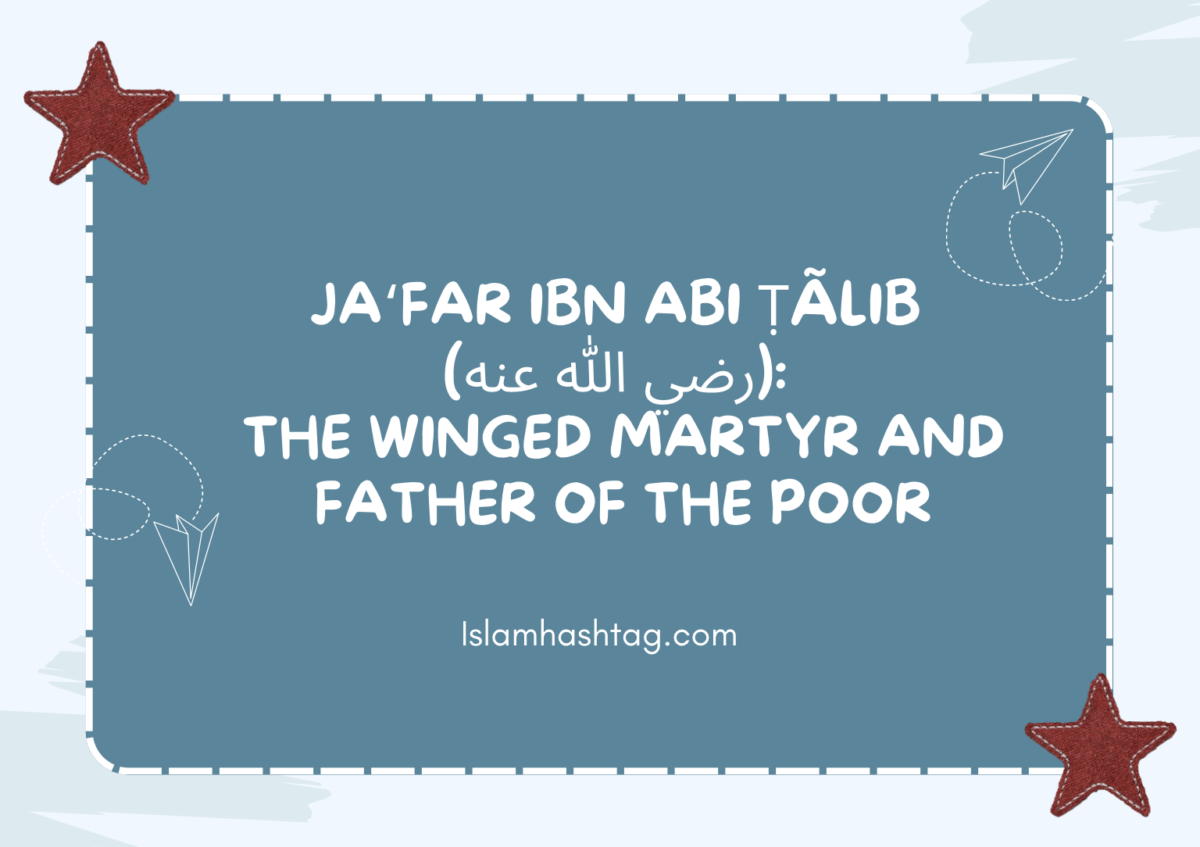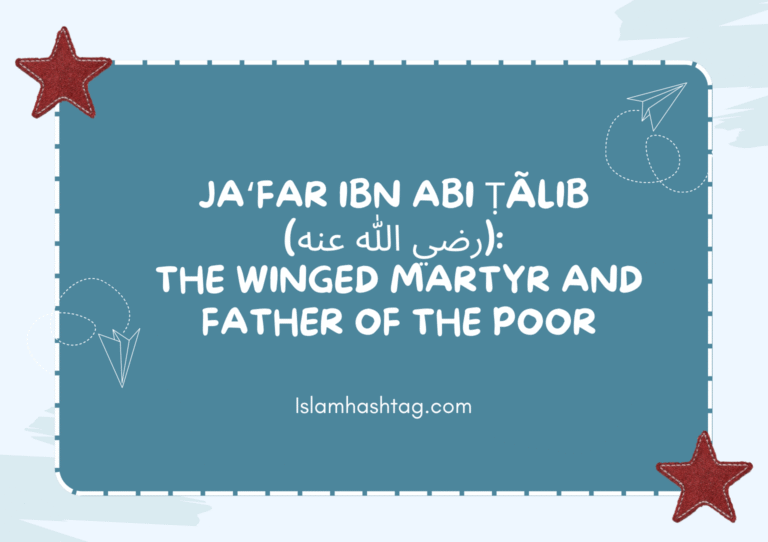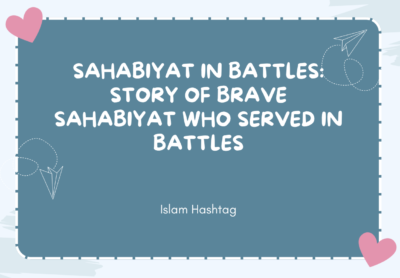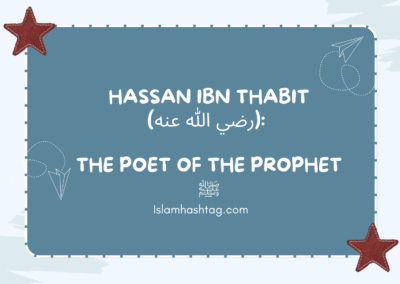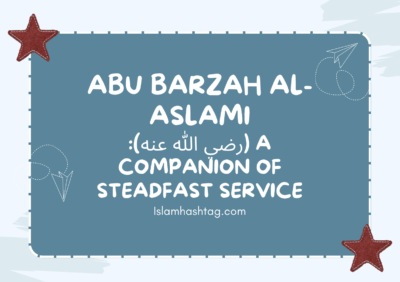Ja‘far ibn Abi Ṭālib (رضي الله عنه): The Winged Martyr and Father of the Poor
Some names in our history touch the soul before they reach the mind. Ja‘far ibn Abi Ṭālib (رضي الله عنه) is one of them. Whenever I read about him, I feel the tenderness of a heart anchored in īmān and the courage of a believer who let love for Allah and His Messenger ﷺ shape every step. His story is not only a record of battles and journeys; it is a window into prophetic character reflected in a devoted cousin—“the one who most resembled the Prophet ﷺ in appearance and manner.”
Lineage and closeness to the Prophet ﷺ
Ja‘far was Qurashī Hāshimī: Ja‘far ibn Abi Ṭālib ibn ‘Abd al-Muṭṭalib ibn Hāshim. He was the elder brother of ‘Alī (رضي الله عنه) by ten years and the Prophet’s cousin. Early sources describe him as dignified, gentle, and strikingly similar to the Prophet ﷺ in his demeanor and features. This resemblance was not merely outward; it radiated in the way he carried the message—with mercy, clarity, and unwavering trust in Allah.
Why he was called al-Ṭayyār (the one who flies)
Ja‘far is known as Dhū ’l-Janāḥayn—the companion honored with two wings in Jannah. This title was bound to the day of Muʾtah (Jumādā al-Ūlā, 8 AH), when the Muslim army faced a much larger force. After the fall of the first commander, Zayd ibn Ḥārithah (رضي الله عنه), the banner passed to Ja‘far. He fought so fiercely that he dismounted his horse to hold the banner with full resolve. One arm was severed as he clutched the standard; he seized it with the other, and that, too, was cut. He gathered the banner to his chest until he fell—his body bearing more than seventy wounds. Allah honored him with two wings to fly in Paradise, a mercy that turned the pain of his last moments into an eternal ascent.
Early Islam and the two migrations
Ja‘far was among the earliest to accept Islam—around the period when the Prophet ﷺ began calling quietly before moving to Dār al-Arqam. When persecution intensified, he joined the second migration to Abyssinia (al-Ḥabashah), carrying with him both knowledge of the Qur’an and a calm eloquence.
Before the king of Abyssinia
There, Ja‘far stood before al-Najāshī, the just Christian king, and spoke about Islam with a truthfulness that still moves the heart. He described how Allah saved them from ignorance—idolatry, injustice, and severed kinship—by sending a Messenger who called to worship Allah alone, to honesty and mercy, to caring for relatives, neighbors, and the weak. When he recited from Sūrat Maryam, the king’s eyes filled with tears. The plot of Quraysh to retrieve the migrants failed because Ja‘far’s words revealed Islam as it is: light, justice, and compassion. Many narrations mention that al-Najāshī accepted the truth—Ja‘far’s clarity was a means for guidance beyond the Arabian Peninsula.
Reunion at Khaybar
Ja‘far remained in Abyssinia until he heard of the Prophet’s migration to Madīnah. He returned and reached the Prophet ﷺ in 7 AH, during the days surrounding Khaybar. Reports mention the Prophet’s immense joy at seeing him—some narrations convey that he said he did not know which was more pleasing, the victory at Khaybar or Ja‘far’s arrival. That line captures the Prophet’s love for a servant whose faithfulness had bloomed far from the center of events, yet always within the circle of obedience.
His character: courage, generosity, and a heart for the poor
- Courage without vanity: Muʾtah is the clearest mirror of his bravery, but his courage also lived in day-to-day obedience—migrating, trusting Allah in a foreign land, and speaking truth to power with humility.
- Initiative toward goodness: Ja‘far didn’t wait for ease; he sought the first open door to khayr. He led the community in Abyssinia by example—bridging cultures and showing the beauty of Islam through character.
- Generosity and mercy: The Prophet ﷺ called him “Abū al-Masākīn”—the father of the poor—because of his tenderness toward the needy and his constant giving. His care was not perfunctory; it was a warmth that made the vulnerable feel seen and held.
- Resemblance to the Prophet ﷺ: Companions remarked on how Ja‘far mirrored the Prophet’s khulq (character) as well as his khalq (appearance). It’s as if the prophetic light reflected through him—gentle, firm, and beautiful.
Lessons for our lives
- Hold the banner even when the hands tire.
Ja‘far’s last stand is more than a battle scene; it is a parable. Every believer holds a “banner”—a trust from Allah, whether as parent, teacher, student, or neighbor. We protect it with steadfastness, even when the world feels overwhelming. - Speak Islam with beauty.
In Abyssinia, truth prevailed not by volume but by clarity and character. Our da‘wah today needs Ja‘far’s balance—knowledge that is precise and manners that are gentle. - Make room in your heart for the poor.
The title Abū al-Masākīn was not won by a single act of charity; it was the rhythm of his life. Let your routine carry mercy: regular sadaqah, a visit to someone overlooked, a kind word that restores dignity. - Migration without Allah is exile; migration with Allah is elevation.
Ja‘far’s journeys were not escapes; they were hijrah for Allah’s sake. Wherever Allah places us—new cities, new roles—we can plant seeds of faith that blossom in unexpected places.
A life sealed with wings
When the news of battle of Muʾtah reached Madīnah, the Prophet ﷺ grieved and prayed for the fallen commanders. Yet Ja‘far’s story does not end with the cut of a sword; it continues with wings in Jannah and an honor that makes every believer whisper, Allāhumma irfa‘ darajātihi wa’jma‘nā bihi ‘alā al-ḥawḍ. His legacy comforts us: no sacrifice for Allah is lost, no wound for His sake is wasted. What is surrendered in the path of truth is returned by the Most Generous in forms more beautiful than we can imagine.
Key takeaways (for quick study)
- Name & Lineage: Ja‘far ibn Abi Ṭālib (رضي الله عنه), Hāshimī, cousin of the Prophet ﷺ, elder brother of ‘Alī by ten years.
- Titles: al-Ṭayyār, Dhū ’l-Janāḥayn, Abū al-Masākīn.
- Early Islam: Among the first to accept Islam; part of the second migration to Abyssinia; eloquent representative before al-Najāshī.
- Return: Rejoined the Prophet ﷺ around 7 AH, during the time of Khaybar.
- Martyrdom: Fell at Battle of Muʾtah (8 AH) after bearing the banner with extraordinary courage; honored with two wingsin Jannah.
- Character: Courage, initiative in good, generosity, and deep compassion for the poor; strong resemblance to the Prophet ﷺ in character and appearance.
A closing du‘ā
O Allah, grant us a share of Ja‘far’s courage, his clarity in calling to You, and his tenderness for the poor. Make our lives banners of truth that we do not let fall, and gather us with Your beloved ﷺ and his noble family and companions in gardens where the martyrs fly with wings of mercy. Ameen.
Discover more from Islam Hashtag
Subscribe to get the latest posts sent to your email.

